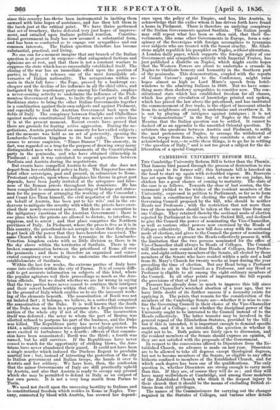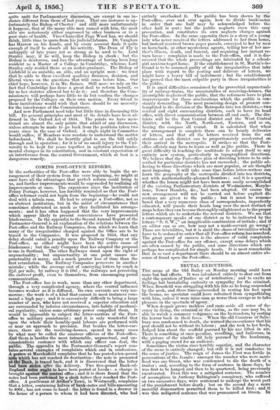CAMBRIDGE UNIVERSITY REFORM BILL.
THE Cambridge University Reform Bill is better than the Phoenix. That famous bird passed through the process.of destruction to rise again equal to its former self; this fortunate bill is knocked on. the head to start up again with redoubled vigour. Mr. Bouverie has sat upon the egg this time ; and, so far as we can judge, his chicken has a good chance of coming to maturity. The state of the case is as follows. Towards the close of last session the Go- vernment yielded to the wishes of the resident members of the University, expressed in petition to Parliament, so far as to form them into a constituency for electing the eight members of the Governing Council proposed by the bill, who should be neither Heads nor Professors ; with the restriction that not more than two of these members should be taken at the same time from any one College. They retained thereby the sectional mode of election rejected by Parliament in the ease of the Oxford Bill, and declined to give the Council the power of nominating the Vice-Chancellor, as well as various other powers now exercised by the Heads of Colleges collectively. The new bill does away with the sectional mode of election, and gives to the Council the power of nominating in all cases where at present the Heads collectively possess it, with the limitation that the two persons nominated for the office of Vice-Chancellor shall always be Heads of Colleges. The Council will therefore now consist of four Heads of Colleges, four Profes- sors, and eight ordinary members of the Senate, all elected by those members of the Senate who have resided within a mile and a half from St. Mary's Church for twenty weeks at least during the year preceding the time of election. But any Head being a Professor is eligible to sit in the Council as a Professor, and any Head or Professor is eligible to sit among the eight ordinary members of the Council. In all other points of importance the bill repeats the provisions of that of last year. Pressure has already done so much to improve this bill since the Lord Chancellor's wretched abortion of a year ago, that we have little doubt of its further success if a necessity exists for applying it. The points that remain for the consideration of the members of the Cambridge Senate are—whether it is wise to con- fine the Governing Council in their choice of the Vice-Chancellor to a Head of a College ; and whether the disciplinal power of the University ought to be intrusted to the Council instead of to the Heads collectively. The latter transfer may be involved hi the general repeal of the Elizabethan Statutes, provided by the bill ; but if this is intended, it is important enough to demand specific mention, and if it is not intended, the question is whether it ought not to be. Both points are fairly open to discussion, and the resident members of the Senate should express an opinion, if they are not satisfied with the proposals of the Government. In respect to the concessions offered to Dissenters from the Es- tablished Church, no advance is made on last year. Dissenters are to be allowed to take all degrees except theological degrees, but not to become members of the Senate, or eligible to any office hitherto confined to members of the Established Church, and for which such degree has been one of the qualifications. The only question is, whether Dissenters are strong enough to carry more than this. If they are, of course they will do so ; and they will have many wellvrishers at Cambridge, and among those members of the Established Church who think it the deepest injury to their church that it should be the means of excluding British ci- tizens from civil privileges. The names of the Commissioners for carrying out the changes required in the Statutes of Colleges, and various other details quite unfit for Parliamentary discussion, are except in one in- stance different from those of last year. That one instance is un- fortunately the Bishop of Chester: and still more unfortunately it happens, that of the many able men named with him, the most able are notoriously either engrossed by other business or in a poor state of health. Vice-Chancellor Page Wood has, we should think, little time to spare from his judicial labours. Dr. Vaughan has Harrow on his hands, and by every account finds it quite enough of itself to absorb all his activity. The Dean of Ely is unhappily of late years not so strong as he used to be. Lord Stanley may, if he will, keep the Bishop in check ; but the Bishop is dexterous, and has the advantage of having been long resident as a Master of a College in Cambridge, whereas Lord Stanley only resided there as an under-graduate. The Bishop of Lichfield is an amiable, an able, and an upright man : we trust that he adds to these excellent qualities firmness, decision, and liberal views on the questions that will come before him. Our chief hope, however, is in Mr. Baines. Still more we rely on the fact that Cambridge has done a great deal to reform herself, so far as her statutes allowed her to do it ; and therefore the Com- missioners will perhaps have little to do but confirm the changes proposed by the Colleges on their own motion. Every friend to these institutions would wish that there should be no necessity for the interference of the Commissioners.
And now Parliament need take but little time in discussing this bill. Its general principles and most of its details have been af- firmed in the Oxford Act of 1854. The points we have men- tioned are almost the only points that admit of any discussion, unless attempts be made to go back from the positions taken two years since m the case of Oxford. A single night in Committee would suffice, if Members were resolute to understand the matter beforehand. We shall be heartily glad to see the bill safely through and in operation ; for it is of no small injury to the Uni- versity to be kept for years together in agitation about funda- mental changes changes in its constitution, and in constant expectation of an interference from the central Government, which at best is a dangerous remedy.



































 Previous page
Previous page